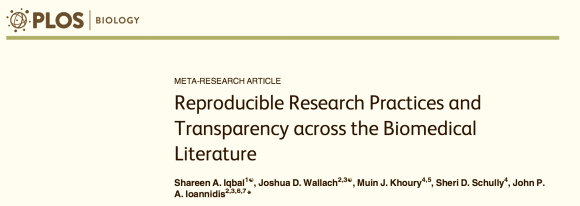An article in the American Journal of Political Science was corrected after the coding of a political attitude variable was accidentally the wrong way around. Pre-publication cross-checks by the authors and the journal, as well as publication of the original data and variable transformations can avoid such problems.
Political Science Replication
Twitter: @PolSciReplicate
Tag Archives: reproducibility
Getting the idea of transparency all wrong
Following an article in the New England Journal of Medicine, which portrayed scientists who re-use data as parasites, we now hear more on this from Nature. Apparently, data transparency is a menace to the public. The Nature comment “Don’t let transparency damage science” claims that the research community must protect authors from harassment by replicators. The piece further infects the discussion about openness with more absurd ideas that don’t reflect reality, and it leads the discussion backwards, not forward.
Continue reading
Don’t review articles that withhold data
 Journal editors can enforce replication policies. Authors can decide to work transparently. Most initiatives for open science and reproducibility agree that editors and authors are are the key actors to enforce the gold standard of research integrity. However, peer-reviewers can use their leverage as well: just say you will only review an article once the author provides the data.
Journal editors can enforce replication policies. Authors can decide to work transparently. Most initiatives for open science and reproducibility agree that editors and authors are are the key actors to enforce the gold standard of research integrity. However, peer-reviewers can use their leverage as well: just say you will only review an article once the author provides the data.
Reproducible Research in Biomedical Science – We’re not there yet
 A new PLoS Biol aper on reproducible research practices across the biomedical literature examines if authors provide all data, code and funding information. The results are devastating.
A new PLoS Biol aper on reproducible research practices across the biomedical literature examines if authors provide all data, code and funding information. The results are devastating.
Political Scientists Trying to Delay Research Transparency
A group of 625 political scientists signed a petition to delay the new APSA guidelines for transparency. They want to discuss the implications for qualitative data, hand-written field notes and confidential data first. I agree that practical discussions are necessary – but this should not be a reason to abandon the transparency guidelines.
Continue reading
Political science should not stop young researchers from replicating
In a blog post by Jesse Singal at the New York Magazine, one of the students who tried to replicate LaCour‘s findings on gay marriage said that young researchers are often actively discouraged from replicating work.
Continue reading
Currently swamped – but I’m sending my data soon
Nicole,
I would be more than happy to share my data with you, but I am currently swamped and have not had time to clean up the dataset that you requested. Normally, this wouldn’t take much but was originally part of a larger dataset that I had created, and that dataset includes data from other authors which did not give me permission to share (Don’t worry – this data is nothing used in the article). It will likely be a few weeks before I can get to this. Will this be too late?
Out of curiously, what type of project are you working on that you would need the dataset? (…)
Best,
______________
I sent two follow-up emails. The author never replied again.
Guest Post: Research Data Review is Gaining Ground, by L. Peer and A. Green
 This we know: Sharing research data with the goal of advancing science is slowly becoming the norm in many disciplines, and a rich ecosystem has sprung up in recent years to support that effort. Yes, technological and cultural challenges remain, but anyone watching this space would agree that much progress has been made. A guest post by Limor Peer and Ann Green.
This we know: Sharing research data with the goal of advancing science is slowly becoming the norm in many disciplines, and a rich ecosystem has sprung up in recent years to support that effort. Yes, technological and cultural challenges remain, but anyone watching this space would agree that much progress has been made. A guest post by Limor Peer and Ann Green.
Continue reading
Good practice in data collection and storing
Research starts with data collection. Before you can do your analysis, you spend hours, weeks, months merging tables and transforming variables. This time is wasted if you don’t keep detailed logs about this process. Here’s a good practice guide.
Continue reading
Replication & Reproducibility 2014: The best stories
 In 2014, the debate on replication and reproducibility in the social sciences moved towards pre-registration, new guidelines for replication studies, but also increasing criticism of replicators.
In 2014, the debate on replication and reproducibility in the social sciences moved towards pre-registration, new guidelines for replication studies, but also increasing criticism of replicators.
Continue reading